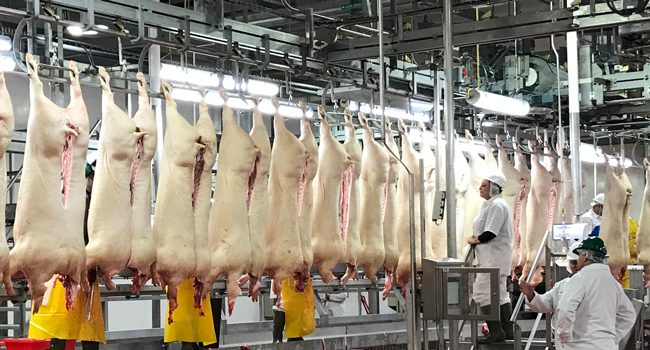The National Swine Inspection Service and Gene Editing Provide Opportunity to Modernize

The U.S. Department of Agriculture’s (USDA) proposed New Swine Inspection Service (NSIS) is part of a continuous effort by the agency’s Food Safety and Inspection Service (FSIS) to ensure a safe supply of wholesome American pork. A voluntary program supported by many years of research, NSIS aims to improve the inspection process by shifting FSIS employees’ responsibilities to focus on inspection duties more directly related to food safety and animal welfare (like plant sanitation and humane handling). In turn, pre-inspection sorting and quality control tasks would be delegated to plant employees on the line. Final inspection accountability and authority remains with the USDA.
Confirming NSIS’ potential to modernize the pork inspection process, the National Association of Federal Veterinarians (NAFV) announced its support for the program on Thursday. Federal veterinarians play an integral role in ensuring our national food safety, and their expertise makes certain that best practices are in place across multiple phases of our food production system. Their endorsement highlights the strong science and research used in designing the NSIS.
Despite mischaracterization of the program by some in the media, HOTH believes this program would truly be a step forward for the pork inspection process. USDA employees will retain their authority and be solely responsible for the entire meat inspection process. By enabling FSIS inspectors to focus on issues more pertinent to animal welfare, food safety, and sanitation, the NSIS will help to provide for a safer food supply, while allowing packing companies to more effectively use their staff and resources. The U.S. pork industry has long been a global leader in offering a quality product to consumers domestically and abroad, and the NSIS program will continue that effort.
The pork industry has modernized in conjunction with advancements in technology, actively embracing innovative ways to remain competitive on a global platform without sacrificing quality and consistency. In addition to modernizing via adoption of NSIS, HOTH is supportive of gene editing technology as a tool for improving animal health and welfare, while reducing the need for antibiotics on American pig farms. Gene editing shortens the timeframe through which changes in DNA can be achieved via natural breeding and can allow for traits such as disease resistance to be shared widely within animal populations. With diseases such as Porcine Reproductive and Respiratory Syndrome (PRRS) and African Swine Fever (ASF) adversely affecting swine herds worldwide, gene editing technology has enormous potential as a preventative measure to provide for herd health. Additionally, improved herd health will lessen the need for antibiotic use on farms.
While countries like Canada, Brazil and Argentina are moving quickly on this advancement to gain competitive advantage in the market, the U.S. is running the risk of falling far behind as a result of a regulatory seize by the Food and Drug Administration (FDA). Under FDA regulation, gene editing faces an impractical, lengthy and expensive approval process, threatening hundreds of thousands of jobs and nearly six percent of U.S. Gross Domestic Product.
Obstacles placed by the FDA’s overreach place the American livestock industry at a competitive disadvantage, and severely hamper opportunities in improved production efficiency, research, and animal welfare.
Improvements in the inspection process and animal breeding should be implemented to allow for continued progress on food safety and animal welfare. We should be using these tools to keep America first in agriculture, as preventing their adoption only hinders progress.